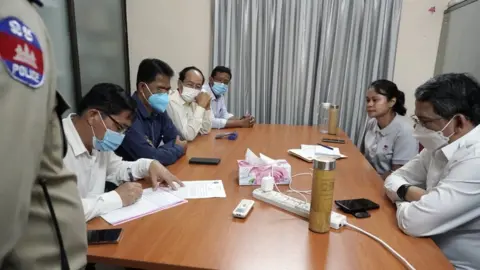Cambodia's Hun Sen shuts down independent media outlet Voice of Democracy
 Hean Rangsey/VOD
Hean Rangsey/VODCambodia's leader Hun Sen has shut down one of the country's last independent media outlets - just months before the country's election.
VOD, or the Voice of Democracy, had published a story last week that "hurt" his government's reputation, Hun Sen said in a Facebook post on Sunday.
He has refused to accept the group's apology - cancelling its licence on Monday.
Advocates say VOD's loss is a major blow to the nation's limited press.
Editors at the news organisation confirmed to the BBC that police had arrived at their Phnom Penh office on Monday morning with an order revoking their operating licence.
Access to past stories on VOD's Khmer and English sites has also been blocked by some internet service providers, staff confirmed.
"People are shocked and still trying to process this," associate editor Ananth Baliga told the BBC on Monday. "It has been a very accelerated time frame from when the story was published to the suspension of a licence."
On Sunday, Hun Sen said he was shutting down VOD after the outlet published a story about Cambodia's aid response to the Turkey earthquake. The 9 February report said a $100,000 (£83,000) package had been signed off by his elder son, Hun Manet.
Hun Manet is the deputy commander-in-chief of the Cambodian army, but foreign aid packages can only be signed off by the prime minister. Hun Sen said such a report had damaged his government's reputation and demanded an apology.
The Cambodian Center for Independent Media (CCIM), the non-governmental organisation which operated the news organisation, issued a statement saying the outlet had been quoting a government spokesman in its report and that it regretted the confusion caused.
But Hun Sen said the response was "unacceptable". He ordered the media outfit's closure at 10:00 Monday local time (03:00 GMT), and also told foreign donors to the outlet to take their money back.
The CCIM has received funding from several Western embassies, as well as rights and press freedom groups including Reporters Without Borders and Transparency International.
VOD published and broadcast in Khmer and English, and recent stories had included ground-breaking coverage on a slavery scam.
Its mission, as stated on its website, was to "promote democratic governance, human rights, the development of all economic sectors, and an independent and sustainable environment for media".
Many Cambodia watchers said it was the main remaining news organisation in the country doing hard-hitting journalism after a major crackdown on civil expression in 2017 and 2018.
VOD's shut down comes just months before the country's election in July, a vote which has long been dominated by Hun Sen's Cambodian People's Party.
Hun Sen, 70, is one of the world's longest-serving authoritarian leaders, having ruled Cambodia since 1985. He's currently serving a sixth term as prime minister in what is effectively a one-party state, having forced several opposition politicians into jail or exile in recent years.
Josef Benedict, a researcher with global civil society group CIVICUS, said VOD's closure was part of a continued "assault on civic space and press freedom" in Cambodia.
In September 2017, the Cambodia Daily newspaper was also forced to close after the government ordered it to pay a $6.3m (£4.9m) tax bill.
Associate editor Mr Baliga told the BBC the shut-down of VOD was almost "inevitable" given the political climate.
"We hope some resolution can come out of this, so we can continue doing the journalism of accountability, the journalism that is critical to Cambodia in a media environment where there is not much of that," he said.
